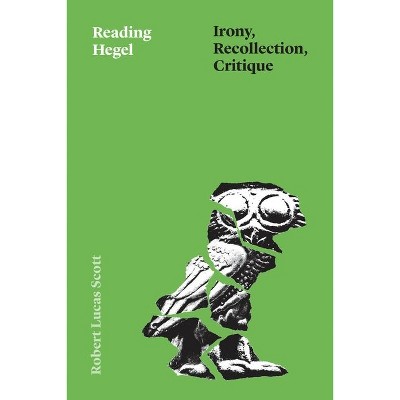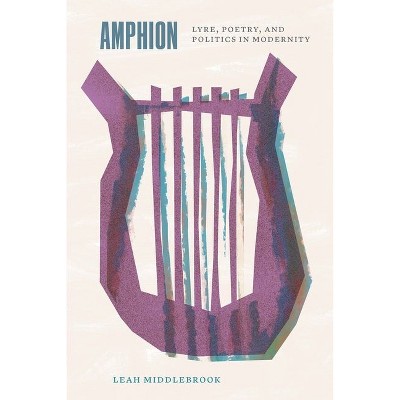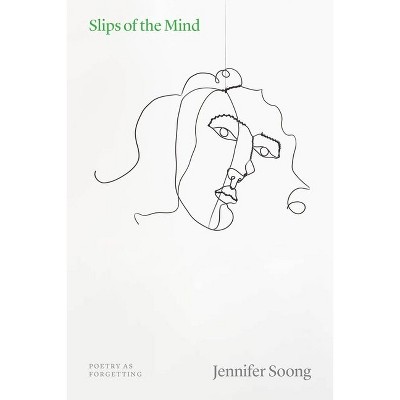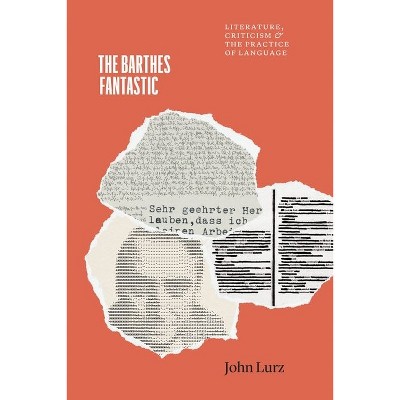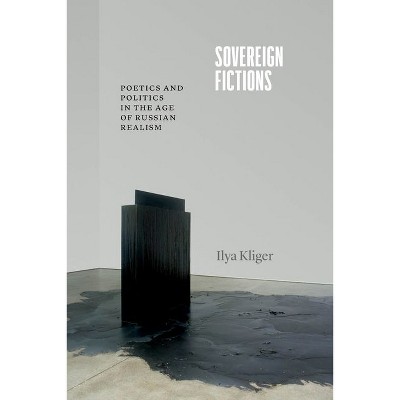Sponsored

Criticism and Truth - (Thinking Literature) by Jonathan Kramnick
$99.00
In Stock
Eligible for registries and wish lists
Sponsored
About this item
Highlights
- A defense and celebration of the discipline of literary studies and its most distinctive practice--close reading.
- About the Author: Jonathan Kramnick is the Maynard Mack Professor of English and director of the Lewis Walpole Library at Yale University.
- 136 Pages
- Literary Criticism, Semiotics & Theory
- Series Name: Thinking Literature
Description
About the Book
"What kind of truths does literary criticism tell about the world? In this book, Jonathan Kramnick explains literary criticism's distinctive epistemology-and its disciplinary rationale-by zeroing in on its singular method: close reading. Close reading, for Kramnick, is the field's way of pursuing arguments and advancing knowledge, and the crucial craft that it imparts to students. He unpacks literary criticism's art of in-text quotation and other reading methods, advocating for them as a valuable form of humanistic expertise worthy of a prominent place within a multi-disciplinary university. As the humanities fight for survival in contemporary higher education, the study of literature doesn't need more plans for reform. Rather, it needs a defense of the work already being done and an account of why it should flourish. This is what Criticism and Truth offers, in vivid and portable form"--Book Synopsis
A defense and celebration of the discipline of literary studies and its most distinctive practice--close reading. Does literary criticism offer truths about the world? In Criticism and Truth, Jonathan Kramnick offers a new and surprising account of criticism's power by zeroing in on its singular method: close reading. Long recognized as the distinctive technique of literary studies, close reading is the critic's way of pursuing arguments and advancing knowledge, as well as the primary skill taught in the English major. But it is also more than that--a creative, immersive, and transformative writing practice that fosters a unique kind of engagement with the world. Drawing on the rich and varied landscape of contemporary criticism, Kramnick changes how we think about the basic tools of literary analysis, including the art of in-text quotation, summary, and other reading methods, helping us to see them as an invaluable form of humanistic expertise. Criticism and Truth is a call to arms, making a powerful case for the necessity of both literature and criticism within a multidisciplinary university. As the humanities fight for survival in contemporary higher education, the study of literature doesn't need more plans for reform. Rather, it needs a defense of the work already being done and an account of why it should flourish. This is what Criticism and Truth offers, in vivid and portable form.Review Quotes
"In Criticism and Truth, Kramnick, who teaches at Yale, watches Ph.D. programs contract and the old theory wars fossilize and struggles to find some common ground beyond the critical battles of years past."-- "New York Review of Books"
"One of the gratifications of reading Kramnick's fine book, Criticism and Truth: On Method in Literary Studies, is the pleasure of watching somebody
think. His intention is to defend "literary criticism's standing as a contribution to knowledge" (vii), its epistemic status and claim to creativity--its claim to 'tell the truth' (98) in the face of 'an extinction event in the history of knowledge' (2)."-- "Modern Philology"
"It's a common observation in the discipline of English that for some time now we have lacked a shared object of study. We no longer all read the same core set of texts, and thus, some of us feel, we can no longer talk to each other. . . . But a recent phenomenon seems to be bringing us together again, a new set of texts that we can collectively pore over, interpret, and debate incessantly: books, articles, blog posts, and tweets about the history, current crises, and imminent demise of English as an academic discipline. Jonathan Kramnick's Criticism and Truth enters this crowded field relatively quietly. Its tone is neither strident nor melancholic but calmly celebratory. Rather than taking the polemical tone of other metadisciplinary manifestos, it aims at the straightforward description of academic literary criticism as it is practiced (at least by those who work primarily on literary texts in English). . . . The focus on practice makes this book a refreshing alternative to historical or sociological views from an Olympian vantage."--Katie Kadue "Modern Language Quarterly"
"Kramnick's central claim in Criticism and Truth is that close reading, the signature method of literary criticism, is not a form of reading but a form of writing. Unlike other contributions to state-of-the-field debates, he focuses not on methods of reading or classroom practice, but on the method of academic scholarship. It is the published research, he says, that is the true lifeblood of the discipline."-- "The Point magazine"
"Criticism and Truth comes out swinging. . . . asserting in its final pages that 'the study of literature ... keeps alive values of truth, justice, and beauty that support collective flourishing'. A reader couldn't ask for a clearer defence. . . . Kramnick explains how close reading. . . is different from other disciplines, and how such close attention - not to what a reader hopes or believes a work says, but to what it is actually saying - breeds rigour and objectivity."-- "Times Literary Supplement"
"[A] significant new entrant in the ongoing effort to characterize and defend the value of literary study . . . Kramnick offers a newfound respect for the everyday practices of criticism."-- "Genre"
"An erudite, closely argued and engaging essay, even something of a tract for the times."-- "PN Review"
"Within that field of inquiry, Kramnick's is a vital book indeed, in the senses of both lively and necessary. . . . The book's most vital respondents will ultimately be those emergent and future scholars for whose sake, principally, it aims to describe and celebrate and defend what we do as scholars of literature. But Criticism and Truth is also a clarion call to senior scholars to join in that work."--Paul Saint-Amour "Yale Review"
"[Kramnick] expresses alarm at the prospects of academic literary criticism's continued existence as a recognized field of study within the contemporary university. . . . Articulating the place of literature in 'collective human flourishing'--or specifying what distinguishes literature from other kinds of written language, for that matter-- falls outside Kramnick's project at hand. Bracketing such questions. . . gives the book its quality of extreme concentration and lucidity in the pursuit of the common element in thriving academic literary criticism: the element that must be preserved, lest the whole discipline disappear. . . . [Criticism and Truth] merits attention beyond its field."
--Scott McLemee "Inside Higher Education"
"The authorʼs meticulous analysis offers an eye-opening take on literary criticism as a creative process . . . English scholars will want to take a look."-- "Publishers Weekly"
"Criticism and Truth doesn't just declare a truce in the method wars: it shows that our squabbling has obscured the deeper truth of a shared disciplinary craft. Lavishing his own considerable analytic gifts on the unfairly unloved genre of contemporary criticism, Kramnick beautifully describes--for what feels like the first time--what literary scholars do, and why their everyday virtuosity matters."-- "David Kurnick, Rutgers University"
"Animated by ardency and urgency, written in pellucid prose, argued with finesse and flair, Criticism and Truth is both beautiful and true. It persuades even as it galvanizes. Kramnick's taut, elegant book should be read widely, its moral passion a beacon for all of us who care about the fate of literature and the humanities."-- "Priscilla Gilman, author of "The Anti-Romantic Child" and "The Critic's Daughter""
"Here is the study of literary critical method we needed--a slim volume capable of displacing shelves of manifestos on the future of the discipline. What do literary critics know, and how do they know it? Criticism and Truth grounds our distinctive epistemology in everyday practices--how we quote and paraphrase our objects of study, share the medium of language with them, and build plot summaries. It captures the brilliance of literary critics everywhere, yet only Jonathan Kramnick could have written this gemlike book."-- "Rachel Sagner Buurma, coauthor of "The Teaching Archive""
"In a highly skilled performance of his own, Kramnick discloses the artistry and creativity embedded in routine acts of close reading. Such methodological reflection is long overdue and marks an important step toward making literary critics' tacit values and abilities intelligible to themselves."-- "Elaine Auyoung, University of Minnesota"
About the Author
Jonathan Kramnick is the Maynard Mack Professor of English and director of the Lewis Walpole Library at Yale University. He is the author of Making the English Canon, Actions and Objects from Hobbes to Richardson, and Paper Minds, the latter also published by the University of Chicago Press.Dimensions (Overall): 8.5 Inches (H) x 5.5 Inches (W) x .44 Inches (D)
Weight: .72 Pounds
Suggested Age: 22 Years and Up
Number of Pages: 136
Genre: Literary Criticism
Sub-Genre: Semiotics & Theory
Series Title: Thinking Literature
Publisher: University of Chicago Press
Format: Hardcover
Author: Jonathan Kramnick
Language: English
Street Date: December 4, 2023
TCIN: 1006099759
UPC: 9780226830520
Item Number (DPCI): 247-49-2901
Origin: Made in the USA or Imported
If the item details aren’t accurate or complete, we want to know about it.
Shipping details
Estimated ship dimensions: 0.44 inches length x 5.5 inches width x 8.5 inches height
Estimated ship weight: 0.72 pounds
We regret that this item cannot be shipped to PO Boxes.
This item cannot be shipped to the following locations: American Samoa (see also separate entry under AS), Guam (see also separate entry under GU), Northern Mariana Islands, Puerto Rico (see also separate entry under PR), United States Minor Outlying Islands, Virgin Islands, U.S., APO/FPO
Return details
This item can be returned to any Target store or Target.com.
This item must be returned within 90 days of the date it was purchased in store, shipped, delivered by a Shipt shopper, or made ready for pickup.
See the return policy for complete information.
Trending Poetry

Bestseller
$22.89
was $24.50 New lower price
Buy 2, get 1 free select books
4.6 out of 5 stars with 50 ratings


$22.80
MSRP $38.00
Buy 2, get 1 free select books
4.8 out of 5 stars with 12 ratings

$23.09
Buy 2, get 1 free select books
4.6 out of 5 stars with 32 ratings

$23.09
Buy 2, get 1 free select books
4.4 out of 5 stars with 30 ratings

$9.85 - $23.09
MSRP $15.99 - $32.99
Buy 2, get 1 free select books
4.8 out of 5 stars with 147 ratings
